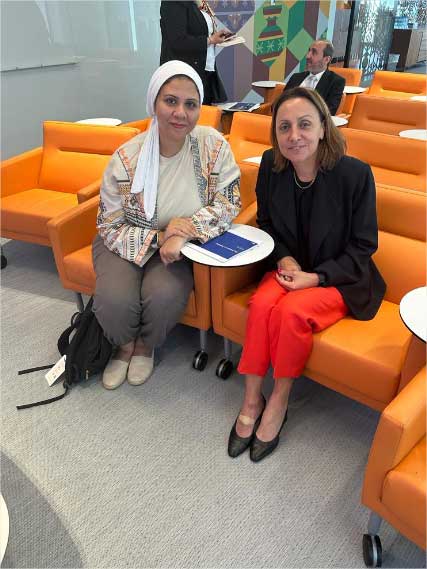In an interview with Ahram Online held during a tour of Visa’s Innovation Centre in Dubai, Serhan said that significant actions have been taken in recent years to make sure that there is digital acceptance with as many merchants as possible in the Egyptian market.
“At Visa, we have seen a growth from I believe 75,000 merchant locations that were enabled with points of sale to over 900,000 ones, and it was really a push from the Central Bank of Egypt (CBE) in the interest of the fintech and banking digitisation in the country,” Serhan said.

“Meanwhile, the CBE has been working hard not only with regards to encouraging merchants to adopt digitised solutions, but also in terms of making sure there are many companies that can assist these merchants. So, it is one of the fastest growing sectors that we have seen across Egypt,” Serhan highlighted.
“Our strategy in Egypt will definitely continue to be around innovation and fintech, and we will continue to work on security and make a risk roadmap with the CBE in terms of making payments more digital and making sure that security guidelines are there, as well as bringing new technologies into the market,” Serhan said on Visa’s plans for the local market.
Visa has a presence in over 200 countries and regions and has cooperation with 14,900 financial institutions across the world. The company issued 3.9 billion electronic cards globally through the end of March 2021, with total payments recording $14 trillion globally by the end of June 2022.
“Small and medium-sized business digitisation is also a focus for our operation in the Egyptian market. So, this includes bringing more merchants into financial inclusion and new low-cost solutions like Tap to Phone and QR payments,” Serhan explained.
On fintech, Serhan said that Visa has observed a successful scene coming out of the Egyptian market, adding that that start-up ecosystem in Egypt has also always been amazing.
“We see initiatives launched by the CBE with the fintech hub, which is very important because you want to make the regulations play in the interest of the innovation ecosystem. We have partnered with them in a number of initiatives like the Visa Everywhere initiative. Also, we see venture funds put in place like Nclude, which is bringing together the big banks in the country to create that fund so as to invest in the Egyptian fintech. I think that there is a vibrant ecosystem for fintech in Egypt for sure,” Serhan said.
Approved by the CBE, Egypt’s largest national banks — Banque Misr, the National Bank of Egypt (NBE), and Banque du Caire — launched Nclude, a fintech support fund, in March 2022 with a key mission of accelerating fintech innovation and driving financial inclusion in the country. This was achieved with an initial investment of $85 million financed by the three national banks as well as other investors, including Egypt’s state-owned e-finance Investment Group and Egyptian Banks Company.
The fund also has a plan to attract further investment from prominent regional and international investors.
Serhan also discussed the trend of contactless transaction, which has been adopted in Egypt’s payment atmosphere.
“Contactless payments have tripled in the region. In North Africa, the Levant and Pakistan, contactless transactions increased from 2 percent to 34 percent of all transactions from 2019 and 2022. We believe that as of next year, 80 percent of all cards will be contactless across the region’s countries. We work with the regulators in Egypt to raise the limit of the contactless transactions and to facilitate the process,” Serhan said.
Serhan also said that there are seven trends that will shape payments globally, which are fintech, big tech, real-time payments (RTP), e-wallets, open banking, buy now pay later (BNPL), and crypto.
On crypto and digital currencies, Serhan said that they represent a trend that cannot be ignored, stressing that this trend will spread in the MENA region, and so regulations are needed to govern this activity.
She also said that she expects central banks in the region will release their own digital currencies in response to the significant developments in the financial sector and its related digital transformation updates.
On ongoing cooperation with the public and private sectors in Egypt, Serhan said that there is much collaborations in the pipeline in Egypt, whether with the private sector or the government across various of sectors, including fintech, telecom operators, security, and SMEs.
On how Visa’s Innovation Centre can benefit the fintech and the innovation scene in Egypt, Serhan explained that the centre has already been organising virtual and physical tours for its partners in Egypt.
“Our innovation and design team can help cocreate and codesign new possibilities that are meant to solve the problems they are experiencing or likely to face in their work. Our centre will benefit the Egyptian market in the areas of fintech and innovation through new solutions. We rely on fintech to make innovation and creation real,” Serhan said.
Short link: